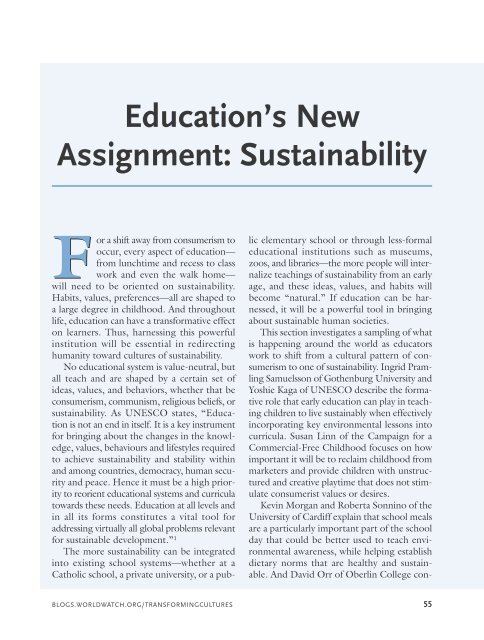State of the World 2010, Transforming Cultures, From - Worldwatch
State of the World 2010, Transforming Cultures, From - Worldwatch
State of the World 2010, Transforming Cultures, From - Worldwatch
You also want an ePaper? Increase the reach of your titles
YUMPU automatically turns print PDFs into web optimized ePapers that Google loves.
Education’s New<br />
Assignment: Sustainability<br />
For a shift away from consumerism to<br />
occur, every aspect <strong>of</strong> education—<br />
from lunchtime and recess to class<br />
work and even <strong>the</strong> walk home—<br />
will need to be oriented on sustainability.<br />
Habits, values, preferences—all are shaped to<br />
a large degree in childhood. And throughout<br />
life, education can have a transformative effect<br />
on learners. Thus, harnessing this powerful<br />
institution will be essential in redirecting<br />
humanity toward cultures <strong>of</strong> sustainability.<br />
No educational system is value-neutral, but<br />
all teach and are shaped by a certain set <strong>of</strong><br />
ideas, values, and behaviors, whe<strong>the</strong>r that be<br />
consumerism, communism, religious beliefs, or<br />
sustainability. As UNESCO states, “Education<br />
is not an end in itself. It is a key instrument<br />
for bringing about <strong>the</strong> changes in <strong>the</strong> knowledge,<br />
values, behaviours and lifestyles required<br />
to achieve sustainability and stability within<br />
and among countries, democracy, human security<br />
and peace. Hence it must be a high priority<br />
to reorient educational systems and curricula<br />
towards <strong>the</strong>se needs. Education at all levels and<br />
in all its forms constitutes a vital tool for<br />
addressing virtually all global problems relevant<br />
for sustainable development.” 1<br />
The more sustainability can be integrated<br />
into existing school systems—whe<strong>the</strong>r at a<br />
Catholic school, a private university, or a pub-<br />
lic elementary school or through less-formal<br />
educational institutions such as museums,<br />
zoos, and libraries—<strong>the</strong> more people will internalize<br />
teachings <strong>of</strong> sustainability from an early<br />
age, and <strong>the</strong>se ideas, values, and habits will<br />
become “natural.” If education can be harnessed,<br />
it will be a powerful tool in bringing<br />
about sustainable human societies.<br />
This section investigates a sampling <strong>of</strong> what<br />
is happening around <strong>the</strong> world as educators<br />
work to shift from a cultural pattern <strong>of</strong> consumerism<br />
to one <strong>of</strong> sustainability. Ingrid Pramling<br />
Samuelsson <strong>of</strong> Go<strong>the</strong>nburg University and<br />
Yoshie Kaga <strong>of</strong> UNESCO describe <strong>the</strong> formative<br />
role that early education can play in teaching<br />
children to live sustainably when effectively<br />
incorporating key environmental lessons into<br />
curricula. Susan Linn <strong>of</strong> <strong>the</strong> Campaign for a<br />
Commercial-Free Childhood focuses on how<br />
important it will be to reclaim childhood from<br />
marketers and provide children with unstructured<br />
and creative playtime that does not stimulate<br />
consumerist values or desires.<br />
Kevin Morgan and Roberta Sonnino <strong>of</strong> <strong>the</strong><br />
University <strong>of</strong> Cardiff explain that school meals<br />
are a particularly important part <strong>of</strong> <strong>the</strong> school<br />
day that could be better used to teach environmental<br />
awareness, while helping establish<br />
dietary norms that are healthy and sustainable.<br />
And David Orr <strong>of</strong> Oberlin College con-<br />
BLOGS.WORLDWATCH.ORG/TRANSFORMINGCULTURES 55


